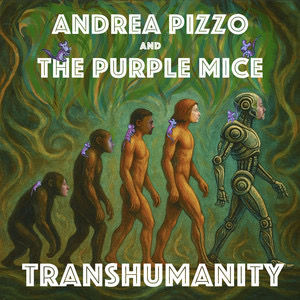ANDREA PIZZO AND THE PURPLE MICE Transhumanity
- Patrick

- Sep 24, 2025
- 3 min read

Andrea Pizzo and the Purble Mice’s Transhumanity is a bold, unclassifiable work that pushes the boundaries of genre and concept. A project that defies conventional structures, this album immerses listeners in a sonic landscape that fuses rock, pop, and electronic elements with intellectual and philosophical musings. Based in Genoa, Italy, the collective led by Pizzo, with lyrical contributions from his wife Raffaella Turbino and a rotating cast of collaborators tackles the intersection of humanity, technology, and emotion in a way that is as experimental as it is profound. The album’s strength lies not just in its unconventional sound but in its ability to make sense of a fragmented, ever-evolving world through the lens of history, science, and speculative fiction.
Opening with “Ada,” a track sung from the perspective of the brilliant mathematician Ada Lovelace, Transhumanity immediately sets the tone for the album’s intellectual and creative ambitions. With lyrics that blend logic and poetry, the song is a meditation on the relationship between mathematics, language, and imagination elements often seen as separate but here unified in a seamless narrative. Lovelace’s words, “If you can give me poetry, give me logic/Imagination, mathematics are the language/Of unseen relation between things,” encapsulate the album’s philosophy: that creativity and reason are not opposing forces, but two sides of the same coin. Pizzo’s vocals, tinged with an unmistakably Italian cadence, add an unexpected layer to the song, giving it an aura of foreignness that heightens its sense of otherworldliness and fusion.
The album unfolds with a diverse range of tracks that explore historical and scientific figures through an imaginative, almost playful lens. “The Current War” takes on the rivalry between Nikola Tesla and Thomas Edison, blending a punk-infused sound with playful narration and lyrical singing to bring the story to life in a fun and energetic way. This stands in contrast to “The Ballad of Alan Mathison,” a melancholy, introspective track that dives deep into the mind of the renowned mathematician Alan Turing, combining poetic imagery with contemplative tones. Songs like “Hidden Figures” and “Bombshell” continue this trend, offering new perspectives on familiar historical figures, breathing life into their legacies through experimental and evocative musical textures.
it’s the more conceptual tracks that truly showcase the band’s willingness to step outside of the musical mainstream. “The Space and Beyond” is a haunting adaptation of Ambrosius Mediolanensis’ Versus de Naturis Rerum, spliced with recitations from Isaac Asimov’s Three Laws of Robotics. The track’s instrumental section lingers with an eerie, atmospheric quality, leaving the listener to ponder the implications of artificial intelligence and humanity’s place within the universe. On the other hand, “Eternità” might just be the album’s crowning achievement. A stunning fusion of operatic vocals and hard-hitting electric guitar solos, this track features lyrics from the Homeric Hymn to Aphrodite, translated into Italian. Pizzo and guest vocalist Antonella Suella deliver the piece in an operatic style, evoking the grandiosity of Florence + the Machine, while the aggressive guitar work brings an electric intensity that gives the track a sense of urgency. The result is a haunting, evocative piece that lingers long after the album ends.
Transhumanity is, at its core, an album about the future about humanity’s complex relationship with machines, science, and our own emotions. Andrea Pizzo and the Purble Mice present a world where boundaries between the human, the artificial, the emotional, and the intellectual blur into one cohesive whole. The album stands as a testament to the power of artistic vision, with its intricate compositions, thought-provoking lyrics, and genre-defying soundscapes. It’s an ambitious work that doesn’t fit neatly into any box, but rather challenges listeners to think, feel, and experience music in entirely new ways. Whether you’re drawn to its historical references, its speculative philosophy, or its experimental sound, Transhumanity offers something refreshingly unique in an industry that often feels repetitive.
Written by Patrick
















Comments